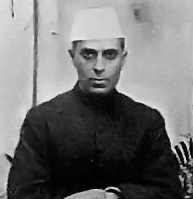© Domenic Marbaniang, Indian Secularism (2005)
To an atheist, religion represents superstition, primitive fear, and suppression. Such blind faith is antithetical to the rational and scientific character of secularism. While religion looks beyond the world, secularism looks within the world for answers. Nehru who represented this atheistic form of secularism wrote:
Nehru represented the Western form of secularism very well. While Gandhi stressed on the equality of all religions and religious pluralism, Nehru was more inclined towards the modernity of the Enlightenment. In fact, Kazi Anwarul Masud considers him to be the first in India to have accepted Western secularism. He writes:
---------------
Kazi Anwarul Masud, How fares secularism in India? The Daily Star
Harvey Cox, The Secular City, p. 76
Laxminidhi Sharma, Dharma Darshan ki Rooprekha, p. 434
Vishal Mangalwadi, India: The Grand Experiment, p. 12
To an atheist, religion represents superstition, primitive fear, and suppression. Such blind faith is antithetical to the rational and scientific character of secularism. While religion looks beyond the world, secularism looks within the world for answers. Nehru who represented this atheistic form of secularism wrote:
‘India is supposed to be a religious country above everything else.. The spectacle of what is called religion or at any rate organised religion in India and elsewhere has filled me with horror and I have frequently condemned it and wished to make a clean sweep of it. Almost always it seemed to stand for blind belief and reaction, dogma and bigotry, superstition and exploitation, and preservation and exploitation of vested interests.’Nehru’s aversion towards religion is well known. He is said to have ‘always grimaced painfully whenever he had to go through even the most perfunctory religious observance.’ He once even angrily waved away a Hindu sadhu who tried to anoint him with holy water at a dam dedication. During the Independence Struggle, it was Nehru, Jinnah, and Subhash Chandra Bose who maintained that it was wrong for religion to interfere in politics. From 1920 onwards, Nehru’s view that all human enterprise should be delivered from religious dominance became more apparent. As an agnostic, he believed in rationality, secularism, and a scientific approach as the true means of progress in India. He understood that the destruction of religious superstition by secularism was the only means to a peaceful India. In a country divided by religious differences, of fundamental nature, Nehru looked at secularism as a great cementing force of the diverse people of India. Secularism had to displace the religious outlook if people of India were to live and grow together in unity and fraternity.
Nehru represented the Western form of secularism very well. While Gandhi stressed on the equality of all religions and religious pluralism, Nehru was more inclined towards the modernity of the Enlightenment. In fact, Kazi Anwarul Masud considers him to be the first in India to have accepted Western secularism. He writes:
‘While Mahatma Gandhi and Maulana Azad spoke of secularism from the perspective of religion, Pandit Nehru was the first in the sub-continent to accept the western concept of secularism.’When he became the Prime Minister of Independent India, he confessed that it had been extremely difficult for him as a Prime Minister to build a secular State out of a religion-dominated nation. It was the able leadership of a secular visionary such as Nehru that held India together through out the early turbulent years of the country. In a country where the population in majority was Hindu (one reason behind the Muslim League’s skepticism regarding the possibility of true secularism in India), it was the secular vision of Nehru that helped him maintain the ‘rule of law’ in a democracy which was continually in danger of falling into the ‘rule of people.’ India, therefore, owes a lot to Nehru for the development of a form of secularism in India that was Constitutional and not majoritarianist. To the chagrin of the Hindutvavadis, it is this form of secularism that makes possible for people of all religions to live together under legal protection and keeps any community in majority from violating the rights of the minority. Nehru’s agnosticism and rationalism had no place for religious dictates in political matters. Therefore, he was able to see religion with a scientific eye and keep religious fundamentalism from sabotaging Indian politics.
---------------
Kazi Anwarul Masud, How fares secularism in India? The Daily Star
Harvey Cox, The Secular City, p. 76
Laxminidhi Sharma, Dharma Darshan ki Rooprekha, p. 434
Vishal Mangalwadi, India: The Grand Experiment, p. 12

Comments
Post a Comment